 Petzlover
Petzlover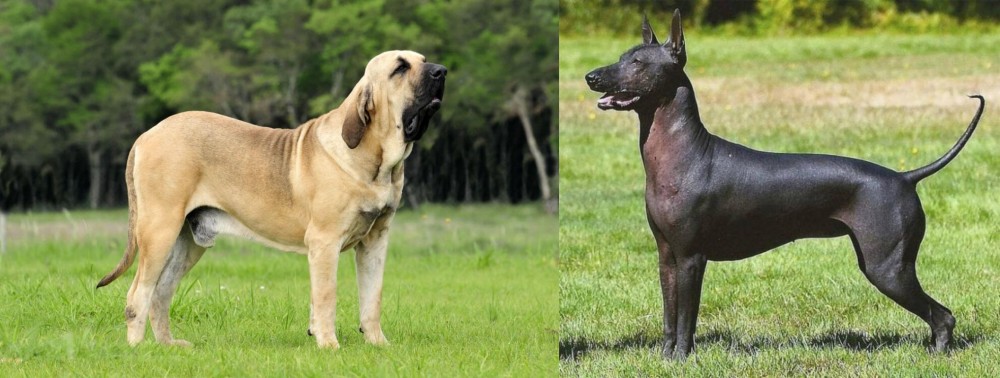 Fila Brasileiro is originated from Brazil but Hairless Khala is originated from Mexico. Fila Brasileiro may grow 34 cm / 14 inches higher than Hairless Khala. Fila Brasileiro may weigh 66 kg / 146 pounds more than Hairless Khala. Both Fila Brasileiro and Hairless Khala has almost same life span. Both Fila Brasileiro and Hairless Khala has almost same litter size. Both Fila Brasileiro and Hairless Khala requires Moderate Maintenance.
Fila Brasileiro is originated from Brazil but Hairless Khala is originated from Mexico. Fila Brasileiro may grow 34 cm / 14 inches higher than Hairless Khala. Fila Brasileiro may weigh 66 kg / 146 pounds more than Hairless Khala. Both Fila Brasileiro and Hairless Khala has almost same life span. Both Fila Brasileiro and Hairless Khala has almost same litter size. Both Fila Brasileiro and Hairless Khala requires Moderate Maintenance.
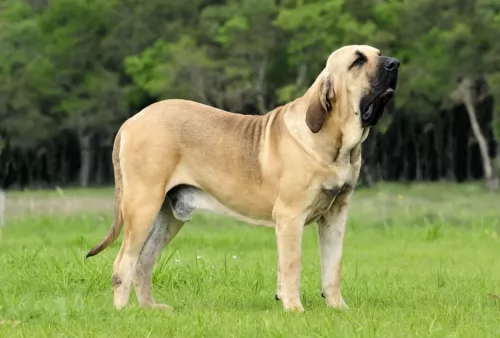 Hailing from Brazil, and known also as the Brazilian Mastiff, nobody seems to be too sure of the exact origins of the large Fila Brasileiro but it is believed to be a cross between the English Mastiff, the Bulldog and the Bloodhound.
Hailing from Brazil, and known also as the Brazilian Mastiff, nobody seems to be too sure of the exact origins of the large Fila Brasileiro but it is believed to be a cross between the English Mastiff, the Bulldog and the Bloodhound.
Other theories are that the dog comes from a mix of Portuguese and Spanish dogs and that they were bred to guard livestock from predators. Breeds that have no doubt contributed to the modern Fila are the Bullenbeisser, the Bloodhound, Mastiff and Rafeiro do Alentejo. All these dogs have characteristics such as excellent working dog skills, herding instincts as well as courage and tenacity.
The official Brazilian breed standard of the Fila was developed in the 1960s and the Fila Brasileiro Club of America was formed in 1984.
 The Hairless Khala is from a number of Latin American countries, and these countries have a variety of these hairless hounds.
The Hairless Khala is from a number of Latin American countries, and these countries have a variety of these hairless hounds.
The dogs are known by different names. Khala is the Bolivian Quechua Indian name and it means 'no clothing' - an absence of fur. Both Central and South America have their hairless dogs, descendants of ancestral dogs owned by the Incan Empire.
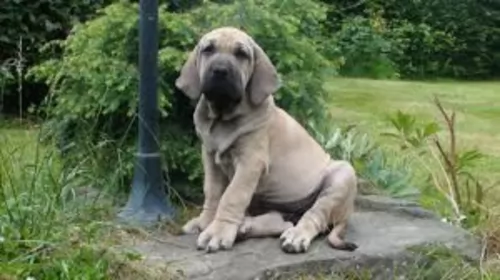 With his huge head covered in loose skin much like that of a Blooohound, and a body resembling that of a Mastiff, the large heavily built Fila Brasileiro is a mastiff breed from Brazil. He stands at 60 to 75cm in height and he weighs roughly 55 to 80kg.
With his huge head covered in loose skin much like that of a Blooohound, and a body resembling that of a Mastiff, the large heavily built Fila Brasileiro is a mastiff breed from Brazil. He stands at 60 to 75cm in height and he weighs roughly 55 to 80kg.
The ears of the Fila are large and droop down or are folded back, depending on his mood. The tail is long and slim. The coat of the dog is short and dense with the texture being quite smooth and soft. Colours of the coat can vary from solid fawn or black to red to brindle.
Perhaps the huge Fila wouldn’t be a good choice as a pet for the first-time inexperienced dog owner as he is a powerful, intelligent, self-assured, headstrong animal that will certainly need to have training and socialization if you want him as an obedient pet in your home.
He is a dog known for his courage and bravery. The Fila is loving and affectionate with his human family, being protective of them and not being too friendly with strangers. He isn't a particularly good pet choice with children in the home.
Some people, after buying a cute Fila puppy, put him out in the yard when he becomes large, and then they pretty much neglect him. This is cruel and irresponsible as he is a social, playful dog who wants to be part of his human family.
These dogs have some aggression in them and this makes them good watchdogs. They generally don’t show aggression towards their family but may snap at a stranger who tries to touch as he feels threatened.
 There are 2 kinds of hairless Khalas – the Medio one which is a short legged dog which stands at roughly 36 – 41cm in height and weighs roughly 6 – 14kg. The other kind of khala is the Hairless Khala Grande, a long legged type.
There are 2 kinds of hairless Khalas – the Medio one which is a short legged dog which stands at roughly 36 – 41cm in height and weighs roughly 6 – 14kg. The other kind of khala is the Hairless Khala Grande, a long legged type.
Although the dog is hairless, you'll find some hair on the top of his head. For sake of space we'll refer to the Medio variety, a medium-sized hound with hairless skin which is dark grey in color.
The Hairless Khala is a friendly dog with his family but tends to be reserved with strangers. He gets on well with children in the home and because he isn't a particularly energetic dog, elderly people also find that he makes a super pet for them.
He is able to adapt easily to city- as well as country living. You need to be careful with him and not allow him out in the garden in the boiling sun as his skin can burn badly. Then again, without fur, he also tends to get cold easily.
He has dark brown eyes and the ears are fairly large in size and erect. He has a chest which is deep and broad and his tail is set fairly low and is held according to his mood.
He is an intelligent dog, and therefore easily trained. He is a loving, loyal dog who is capable of bonding closely with his human family.
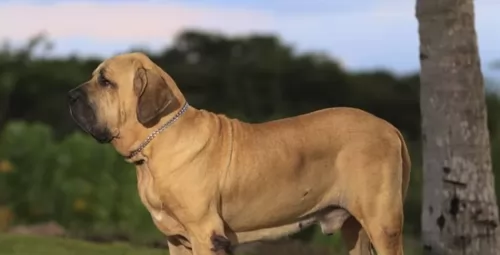 The Fila Brasileiro or Brazilian Mastiff is a powerful dog and it is believed that a large dog like this can be a danger to people if he isn’t trained and socialized.
The Fila Brasileiro or Brazilian Mastiff is a powerful dog and it is believed that a large dog like this can be a danger to people if he isn’t trained and socialized.
He is therefore not recommended for first time dog owners or homes with small children. He is a dog that is particularly wary of strangers too.
When he has been properly socialized he can be loving, loyal and obedient because it is essentially how a dog is brought up as to how he turns out.
If you bring one of these big, beautiful dogs into your home, have him socialized as a puppy, treat him firmly, but kindly and you could have yourself an extraordinary pet.
 The Hairless Khala will make you an excellent pet, and children and the elderly are attracted to the dog because it is loving and docile. They are aloof with strangers, but training and socialization make him far more tolerant of strangers.
The Hairless Khala will make you an excellent pet, and children and the elderly are attracted to the dog because it is loving and docile. They are aloof with strangers, but training and socialization make him far more tolerant of strangers.
The Hairless Khala is an adaptable dog breed, and will adapt well to life in the city or in the country. Found throughout the Latin American nations, today he is essentially a companion dog, loving to be a devoted friend to his human family.
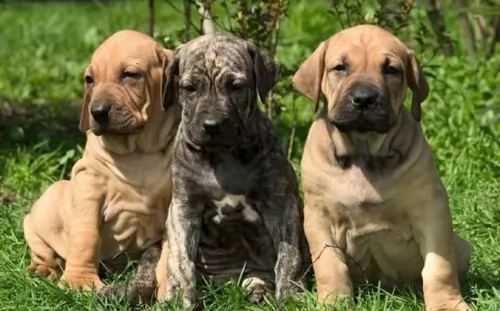 Filas are a dog breed who have a high rate of hip- and elbow dysplasia. This is a serious disease which can lead to lameness with your pet. Other orthopedic diseases with the breed include osteochondritis and luxating patella.
Filas are a dog breed who have a high rate of hip- and elbow dysplasia. This is a serious disease which can lead to lameness with your pet. Other orthopedic diseases with the breed include osteochondritis and luxating patella.
Also, as a deep-chested dog breed, your Fila also is at risk of getting the very serious gastrointestinal syndrome known as bloat. This is a common condition that can prove deadly for your pet. The Fila’s stomach will fill with gas, putting pressure on other organs and stopping blood flow to the heart and difficulty with breathing. Sometimes the stomach will twist. Get him to the vet immediately if you notice a swollen stomach, drooling or restless behaviour.
 The life expectancy of this dog is 10-14 years when he is treated well. The Hairless Khala is a robust dog breed but even so, there are diseases to look out for -
The life expectancy of this dog is 10-14 years when he is treated well. The Hairless Khala is a robust dog breed but even so, there are diseases to look out for -
Skin allergies are one of the reasons you may have to take your Hairless Khala to the vet. These sorts of skin allergies can be frustrating for a dog because the skin is irritated and itchy and he may have scaly areas or red bumps on his skin. If your dog is licking and scratching frantically, you will need to get him to the vet.
Periodontal disease is inflammation of the gums, and if food and bacteria accumulate on the gums, it forms plaque and transforms into calculus, leading to gingivitis. Check your pet's teeth regularly and also brush them with special canine toothbrush and toothpaste at least 2 or 3x a week.
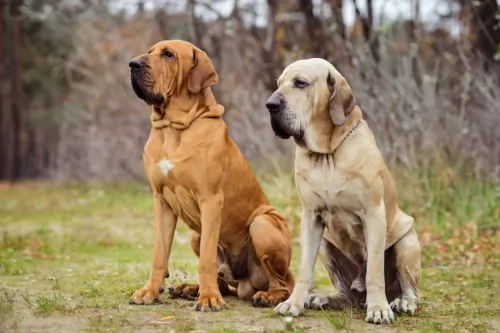 The Filas size makes it important that he have a good amount of exercise if you want to maintain his health and happiness. He isn’t a dog suited to city life as he is too large and will irritate his owners when cooped up in a tiny space with them. He isn’t demanding when it comes to exercise and activities all the time, but he should still be exercised regularly as he is inclined to become lazy .
The Filas size makes it important that he have a good amount of exercise if you want to maintain his health and happiness. He isn’t a dog suited to city life as he is too large and will irritate his owners when cooped up in a tiny space with them. He isn’t demanding when it comes to exercise and activities all the time, but he should still be exercised regularly as he is inclined to become lazy .
Moderate shedding. Regular brushing twice a week will be required. Check ears for infection and brush his teeth 2 or 3 times a week.
Nothing is set in stone as to what to feed your Fila Brasileiro, but a large dog will require quality food with a good amount of protein and fat according to size, age and activity levels.
Because a large breed dog is prone to hip dysplasia, look out for ingredients such as chondroitin and gludosamine which are specifically good for joint health. Try and avoid commercially manufactured food with common allergens such as soy, corn and wheat, artifical flavors and fillers.
A source of cooked rice, chicken and vegetables as well as some raw meat will be excellent for your big pet. Make sure he is never deprived of fresh, cool drinking water.
 He isn't a super energetic dog but still, he will need to be taken for a walk every day.You can also include typical games that all dogs love – fetching a ball or pulling on a rope.
He isn't a super energetic dog but still, he will need to be taken for a walk every day.You can also include typical games that all dogs love – fetching a ball or pulling on a rope.
Because of the dog having little or no hair, they are considered fairly hypoallergenic and also low maintenance. You'd need to brush a dog with fur, but a hairless dog requires different grooming.
Speak to your vet about bathing your dog, the type of body wash to use and how frequently it should be done. Because your dog is hairless, he may require a sun cream in the Summer and a jersey in the Winter.
He will also need his nails clipped and his teeth brushed as part of his grooming process.
He may not have much hair, but when it comes to diet he is much the same as any other dog. If you feed him commercially manufactured food, always choose the best quality one in accordance with his age, height and activity levels.
Home-made food is always a welcome treat for your pet, but whatever you feed him, make sure it has the necessary minerals and vitamins to ensure his health. Essential fatty acids will be needed to keep the skin moist. With too much washing, the skin of these dogs will become irritated, dry and flaking if he doesn't received a nutritious, balanced diet. Make sure he has constant access to fresh, cool water.
When in any doubt as to how to look after a hairless dog, speak to your vet.